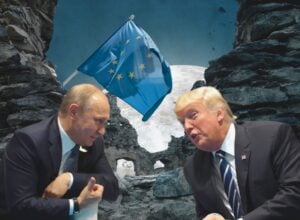„Chciwość, z braku lepszego słowa, jest dobra”. Słowa Gordona Gekko z filmu Wall Street to jeden z najbardziej rozpoznawalnych cytatów w historii kina, często traktowany jako synteza współczesnego kapitalizmu. Jednak to wcale nie jest najbardziej interesująca część jego słynnego monologu.
Jak słusznie zauważają Peter Bloom i Carl Rhodes w książce Świat według prezesów, ciekawsze są słowa Gekko wypowiedziane chwilę później: „Chciwość – zapamiętajcie moje słowa – nie tylko ocali Teldar Paper, ale także inną źle działającą korporację zwaną Stanami Zjednoczonymi”.
Państwo to w zasadzie taka większa firma – ta idea zdominowała współczesną wyobraźnię polityczną. I ma katastrofalne skutki dla naszych społeczeństw.
Pierwszy taki prezydent
Metafora państwa jako firmy skutkuje między innymi przekonaniem, że jeśli ktoś odnosi sukcesy w biznesie, to doskonale nadaje się do rządzenia danym krajem. Kiedy Bloom i Rhodes pisali swoją książkę, wybory w Stanach Zjednoczonych po raz pierwszy wygrywał Donald Trump. Nic więc dziwnego, że to on stał się dla nich symbolem tej przemiany.
W ciągu ostatnich lat o Trumpie napisano wiele: że jest populistą, narcyzem, zwolennikiem teorii spiskowych. Jedna rzecz umyka w większości analiz — fakt, że Trump jest pierwszym prezydentem Stanów Zjednoczonych, który przed objęciem urzędu nigdy nie pełnił żadnej funkcji politycznej.
W historii Stanów Zjednoczonych byli już prezydenci, którzy rozpoczynali swoje kariery w zawodach niezwiązanych z polityką. Ronald Reagan był przecież znanym z westernów aktorem. Ale nawet on, zanim trafił do Białego Domu, przez osiem lat sprawował urząd gubernatora Kalifornii. Trump tymczasem przeskoczył bezpośrednio ze świata biznesu i taniej rozrywki na najwyższe stanowisko polityczne w kraju.
Jednym z kluczowych atutów Trumpa były jego sukcesy biznesowe – prawdziwe bądź rzekome. W trakcie kampanii wyborczej wielokrotnie podkreślał swoje bogactwo, które miało stanowić dowód, jak bardzo nadaje się na stanowisko prezydenta. Ten argument okazał się na tyle przekonujący, że do dziś sondaż za sondażem pokazuje, że „kompetencje ekonomiczne” są według wyborców najsilniejszym atutem Trumpa.
Znamienne jest to, jak Hillary Clinton próbowała podważyć narrację Trumpa w 2016 roku, kpiąc z tego, że jego sukcesy w biznesie są mocno przesadzone. Bloom i Rhodes słusznie wyłapują, że Clinton powinna była wskazać na coś zupełnie innego: sukces w biznesie nie ma znaczenia, jeśli mowa o rządzeniu państwem. Rządzenie krajem to coś więcej niż zarabianie pieniędzy dla siebie i akcjonariuszy. To odpowiedzialność za bezpieczeństwo i pomyślność setek milionów ludzi.
Kropka nad „i”
Dziś, osiem lat po pierwszym zwycięstwie Trumpa, mamy jeszcze lepszy przykład obrazujący, że metafora państwa jako korporacji zakorzeniła się w naszej świadomości: jest nim Elon Musk. Trump musiał mimo wszystko przejść przez tradycyjny proces wyborczy: najpierw wygrać w prawyborach Partii Republikańskiej, a potem główne starcie wyborcze z Partią Demokratyczną.
Musk pokazał, że można pominąć ten etap.
Najpierw kupił za ogromne pieniądze platformę komunikacyjną, jaką jest Twitter, zdobywając wpływ na globalną debatę publiczną. Następnie zainwestował 130 milionów dolarów w kampanię Donalda Trumpa, co zapewniło mu dostęp do jednego z najbardziej wpływowych polityków na świecie. Po wygranej Trumpa szybko okazało się, że Musk jest jedną z najwyżej postawionych osób w jego otoczeniu. Pomaga w obsadzaniu gabinetu, bierze udział w negocjacjach międzynarodowych, ma dostać własny departament i wytycza cele nowej administracji.
Sukces polityczny Muska nie byłby możliwy, gdyby społeczeństwo nie przyjęło bezkrytycznie narracji o zarządzaniu państwem na wzór korporacji. Kontrowersyjny miliarder jest wręcz logiczną konsekwencją tego kulturowego trendu – kropką nad „i”. Jednocześnie stanowi najlepszy dowód na to, jak – z braku lepszego słowa – idiotyczny jest ten trend.
Od poprzednich miliarderów wpływających na politykę różni go nie tylko skala, ale i sposób zaangażowania. „Różnica polega na tym, że Musk robi to w pełnym świetle uwagi publicznej, a dodatkowo zakłada coś na wzór demokratycznego uprawomocnienia swoich działań” – mówi historyk Benjamin Soskis.
Dokładnie tak! Rzecz nie tylko w tym, jakie wpływy kupił sobie Musk, ale także jak wielu ludzi to akceptuje, a nawet traktuje jako pożądany rozwój wypadków. Jakby chcieli powiedzieć „Niech Musk ocali źle działającą korporację zwaną Stanami Zjednoczonymi”.
Nie taki głupi ten Musk
Trend trzeba umieć wykorzystać.
Krytycy Muska często popełniają poważny błąd: bagatelizują jego osiągnięcia, traktując je jako zbieg okoliczności lub efekt fuksa. Znacie pewnie tę opowieść. Musk nie wymyślił Tesli, tylko ją kupił od dwóch inżynierów, którzy ją założyli (w dodatku w pojazdach tej marki podejrzanie często wybuchają groźne pożary). SpaceX opiera się na niebotycznych dotacjach od państwa, bo rząd USA powierza firmie Muska zadania, które wcześniej realizowała NASA. Inwestycja w Twittera okazała się zaś finansowym fiaskiem – Musk wtopił ponad 40 miliardów dolarów w platformę, która dziś jest pewnie warta połowę tej sumy.
Ale…
Tesla i SpaceX to dziś jedne z najważniejszych firm na świecie, a Musk zdominował eksplorację kosmosu. Nawet jeśli Twitter, przemianowany na X, nie jest sukcesem biznesowym, to bez wątpienia stał się skutecznym narzędziem politycznym. Platforma odegrała kluczową rolę w kampanii Donalda Trumpa i najwyraźniej spełniła swoje zadanie.
Musk zdołał wykorzystać swoją działalność biznesową do zdobycia pozycji, która jeszcze przed wyborem Trumpa uczyniła go jedną z najważniejszych postaci w amerykańskiej polityce. Jak zauważył Ronan Farrow w reportażu dla „New Yorkera”, niektórzy pracownicy Pentagonu i innych agencji rządowych traktowali Muska jako nieoficjalnego urzędnika państwowego!
Może pora przyznać: Musk ma rzadko spotykaną zdolność „robienia rzeczy”. I to czyni go szczególnie groźnym.
Właściciel X-a doskonale wychwycił, że idealizowanie liderów biznesu można wykorzystać politycznie. Nie przypadkiem to właśnie on zaproponował Trumpowi stworzenie Departamentu ds. Efektywności Rządu, na którego czele stanął wraz z przedsiębiorcą Vivekiem Ramaswamym. I pewnie nie przypadkiem jest w tej nazwie drugie dno, pod którym kryje się drwina: Department of Government Efficiency to DOGE, czyli memiczny „pieseł”, ale także kryptowaluta, w którą Musk inwestuje.
Zwolennicy Muska już teraz zachwycają się wizją, w której pokaże on, że można zarządzać państwem tak, jak zarządzał Twitterem po jego zakupie – przez zwalnianie większości pracowników i cięcie kosztów na potęgę. Podobnie, dodajmy, jak Trump „zarządzał” wyimaginowanym biznesem w telewizyjnym reality-show The Apprentice, zdobywając przez kilkanaście lat emisji ogromną rozpoznawalność.
Gdybyśmy nie byli owładnięci metaforą państwa jako firmy, łatwiej dostrzegalibyśmy absurdy tej narracji. Zarządzanie platformą cyfrową, która zatrudnia kilka tysięcy osób, a rządzenie kilkusetmilionowym państwem to zupełnie inne wyzwania. Gdybyśmy…
Musk wyciągnął także inną lekcję z sukcesu Trumpa: ludzie nienawidzą elit, dlatego najlepiej udawać outsidera, który nie jest częścią systemu, a raczej z nim walczy i bezustannie go krytykuje – to lekcja, której, swoją drogą, demokraci wciąż nie potrafią odrobić.
To dlatego Musk, dawny pupil Hollywoodu, który pojawiał się w filmach Marvela i inteligentnych sitcomach jak Teoria wielkiego podrywu, zaczął krytykować przemysł filmowy za promowanie „wirusa woke”. To dlatego bez pardonu atakuje dziś media głównego nurtu – te same, które pomogły go wypromować jako rzekomego geniusza. „Teraz wy jesteście mediami” – powtarza swoim fanom na Twitterze, kpiąc z CNN, „New York Timesa” i innych czołowych mediów.
Wydaje się, że ta mieszanka „miliardera-celebryty-outsidera” jest pełna sprzeczności, ale w rękach zdolnego handlarza ściemą – jak Musk – przecież działa.
Dziękujemy, wujku Samie
Kiedy przestaniemy traktować Muska jak klauna, który już za chwilę potknie się o swoje nogi, zrozumiemy wreszcie skalę zagrożenia. Najbogatszy człowiek na świecie właśnie kupił sobie miejsce w Białym Domu. A tylko największy naiwniak może wciąż sądzić, że Musk ma poglądy co najwyżej ździebko na prawo.
Przez ostatnie kilkanaście miesięcy na platformie Muska działała prosta zasada: jeśli ktoś chce podpromować prawicową teorię spiskową, to słynny miliarder najpewniej mu w tym pomoże.
Partia Demokratyczna sprowadza nielegalnych imigrantów, aby zastąpić nimi „prawdziwych” amerykańskich wyborców? Proszę bardzo, Musk chętnie poda dalej i jeszcze skomentuje we właściwym sobie stylu: ciekawe, niepokojące, ludzie powinni to wiedzieć.
Fałszerstwa wyborcze przeciwko Trumpowi? Ależ oczywiście, że Musk włączy się w propagowanie tej teorii.
A może chcecie wypromować teorię, że amerykańska Federalna Agencja Zarządzania Kryzysowego (FEMA) nie pomaga ofiarom huraganów, bo jest zbyt zajęta sprowadzaniem nielegalnych imigrantów? Musk pomoże.
I nie, niestety kontrowersyjny miliarder nie jest tylko wewnętrznym utrapieniem Stanów Zjednoczonych. USA to ciągle na tyle potężne i wpływowe państwo, że każdy, kto sprawuje tam władzę, oddziałuje na resztę świata.
Musk zresztą uwielbia ingerować w sprawy innych krajów. Gdy w Wielkiej Brytanii doszło do antyimigranckich zamieszek, Musk natychmiast zaczął je komentować na swojej platformie. Promował narrację brytyjskiej prawicy o tym, że migranci są sami sobie winni, i oskarżył brytyjski rząd o niesprawiedliwe traktowanie protestujących.
Na podobnej zasadzie oskarżał też niemiecki rząd o to, że jest zbyt otwarty na migrantów, a na liście jego celów znalazły się też Kanada, Brazylia czy Włochy. Za każdym razem scenariusz był podobny: Musk wykorzystywał swój autorytet i wielomilionowe zasięgi, aby wspierać perspektywę skrajnej prawicy i podburzać ludzi przeciw nielubianym przez niego politykom.
Nie należy też zapominać, że swego czasu Musk pochwalił się swoim pomysłem rozwiązania wojny w Ukrainie. Rozwiązanie to było podejrzanie korzystne dla Rosji.
Pamiętajmy, że Musk nie jest zwykłym obserwatorem wojny – jego satelity Starlink są kluczowym elementem w starciu obu armii. Wygrana Trumpa tylko zwiększyła jego wpływy w tej kwestii – wiemy na przykład, że po zwycięstwie Trumpa Musk wziął udział w rozmowie telefonicznej między prezydentem elektem a prezydentem Ukrainy. Wiemy też, że już w 2022 roku Starlink ograniczał Ukrainie możliwości wykorzystania swoich satelitów do atakowania rosyjskich pozycji. Miliarder Elon Musk de facto prowadzi własną, prywatną politykę zagraniczną, zanim jeszcze otrzymał ministerialną nominację od Trumpa.
Wobec takiego rozwoju wypadków reszta świata nie może zająć wygodnej pozycji widza, który z mieszanką rozbawienia i zniesmaczenia ogląda, co wyprawia się na amerykańskiej scenie politycznej. Amerykanie wciągnęli nas wszystkich w to bagno. Dlatego w interesie nas wszystkich jest znalezienie wyjścia.
Polityka potrzebna na wczoraj
Aby zrozumieć, jak mogłaby wyglądać ta droga wyjścia, trzeba wpierw pojąć, dlaczego probiznesowość i antyelitaryzm znalazły taki posłuch.
Mówiąc najkrócej: bo mamy do czynienia z powszechną utratą wiary w demokrację, a jeszcze szerzej – w politykę.
Ludzie mają uzasadnione poczucie, że najważniejsze decyzje są podejmowane ponad ich głowami – przez technokratyczne elity. A każda próba zrobienia czegoś dużego jest przez te elity wyśmiewana jako utopijna, niedorzeczna, groźna.
Stany Zjednoczone są tego doskonałym przykładem. Sondaże pokazują, że większość Amerykanów chętnie opodatkowałaby, i to solidnie, najbogatszych rodaków i największe korporacje, podniosłaby płacę minimalną i wprowadziła powszechną publiczną ochronę zdrowia. Ciągle słyszą jednak, że to mrzonki. Nie da się, chyba wam odbiło, chcecie skończyć jak Związek Radziecki albo Wenezuela?
Europa też nie może się pochwalić jakimiś szczególnie efektownymi reformami. Tak jakby wystrzelała się ze wszystkich śmiałych pomysłów na przełomie XIX i XX wieku. Usługi publiczne, powszechne ubezpieczenia zdrowotne, renty i emerytury, 40-godzinny tydzień pracy, związki zawodowe, płatne urlopy – to wszystko są ponadstuletnie pomysły!
Na tej bezmocy politycznej żerują ludzie tacy jak Musk. Skoro i tak nic nie możemy, skoro kontrolują nas technokraci, to wesprzyjmy tego, który wydaje się najpotężniejszy, najbardziej szalony, najskłonniejszy do zachwiania całym systemem. Niech coś się wreszcie zmieni.
To jedno z najbardziej ponurych świadectw stanu naszych demokracji: że wyborcy raz po raz oddają władzę nieprzewidywalnym oligarchom, wybierając skok w nieznane i nadzieję na „przeoranie” wszystkich instytucji państwa. Mnóstwo wyborców dało się przekonać, że ekscentryczni miliarderzy są ostatnią namiastką sprawczości w naszym świecie. To szczyt ich nadziei politycznych: liczenie, że jakiś CEO zrewolucjonizuje ich państwo-firmę.
Jednocześnie ta ponura puenta kryje w sobie zwiastun nadziei.
Zabrać Muskowi najpotężniejszą broń
Możemy oczywiście liczyć na to, że Musk w końcu popełni jakiś błąd, na przykład wda się w spór z Trumpem, który może się szybko przerodzić w wojnę między magnatami. Ale nawet jeśli Musk się w końcu zakiwa, na jego miejsce wskoczy ktoś nowy, kto wykorzysta to samo rozczarowanie demokracją, ten sam zachwyt nad bogatymi biznesmenami i tę samą niechęć do elit politycznych. Dlatego najskuteczniejszym rozwiązaniem byłoby wybicie z ręki Muska najpotężniejszego narzędzia – rozczarowania polityką.
Właściwie każda grupa polityczna ma tu coś do przemyślenia.
Umiarkowani i centrystyczni politycy, a także komentatorzy polityczni głównego nurtu muszą sobie w końcu zadać pytanie: jeśli rezultatem naszego strachu przed wielką zmianą polityczną są tacy ludzie jak Musk i Trump, to może nie jesteśmy tak rozsądni, jak się nam zdawało?
Co bardziej radykalni, lewicowi i anarchistycznie nastawieni aktywiści powinni sobie zadać inne pytanie: czy ich totalna krytyka polityki jako pola gry skorumpowanych elit nie przynosi skutków odwrotnych do oczekiwanych?
Zamiast doprowadzić do oddolnej, spontanicznej, powszechnej i prawdziwie demokratycznej rewolucji, ta krytyka zdaje się wspierać cyniczną wizję polityki. Cynizm polityczny prowadzi wiele osób nie do poparcia postępowej rewolucji społecznej, ale do wniosku, który jest na rękę takim ludziom jak Musk: skoro wszyscy politycy i wszystkie partie są do dupy, to równie dobrze możemy zagłosować na potężnego, sprawnego biznesmena, żeby zajął miejsce nieudolnych elit politycznych.
Niestety, w kapitalizmie luki pozostawionej przez partie polityczne nie wypełniają oddolne ruchy obywatelskie, a miliarderzy populiści, którzy mają kasę, wpływy i własne kanały propagandowe.
Byłoby świetnie, gdyby trochę więcej „rozsądnych głów” otworzyło się na śmiałe, prospołeczne reformy polityczne, a trochę więcej aktywistów marzących o rewolucji – na trudną i frustrującą współpracę z najbardziej obiecującymi partiami i polityczkami, choć one nigdy nie są doskonałe.
Gdyby ci pierwsi dali sobie spokój z głupkowatym symetryzmem typu „z jednej strony miliarder w konszachtach ze skrajną prawicą, ale z drugiej aktywiści z tym całym dochodem podstawowym czy wyższymi podatkami dla bogatych, więc tu i tu skrajność”. I gdyby ci drudzy przestali udawać, że Alexandria Ocasio-Cortez jest równie słabym wyborem co Joe Biden (a Agnieszka Dziemianowicz-Bąk równie zła jak Donald Tusk) i że do Joe Bidena tak samo im daleko jak do Trumpa i Muska.
Powojenny sojusz socjalistów, liberałów i konserwatystów przyniósł nam państwo dobrobytu. Dalece niedoskonałą, ale najlepszą dotąd organizację wspólnoty politycznej w nowoczesnym wydaniu. Sojusz „rozsądnych głów” i „rewolucjonistów” mógłby nam pomóc przerwać niszczycielski trend oligarchizacji polityki – jeśli taki sojusz jest jeszcze możliwy.

 Wspieraj
Wspieraj 

 Wspieraj
Wspieraj  Wydawnictwo
Wydawnictwo 
 Zaloguj się
Zaloguj się 
















